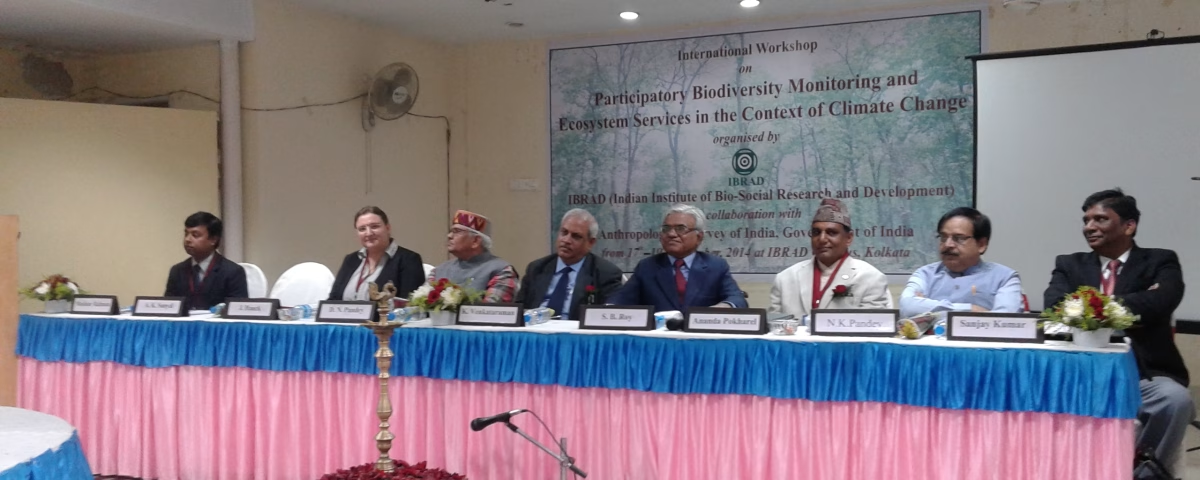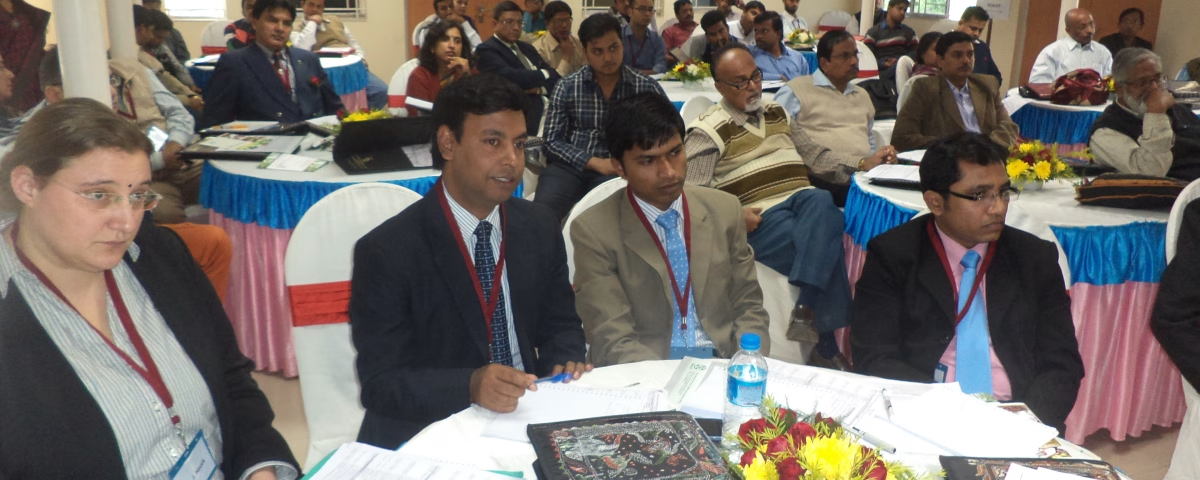Our Global Network & Collaborations
EPRC connects with leading regional and international partners through GARNET-SA to advance research, training, and disaster response initiatives across South Asia.
Workshops & Seminars
Engaged in 40 national and 5 international conferences, fostering knowledge exchange and collaboration.
Training Programs
Conducted extensive training programs, enhancing skills and expertise in environmental and population research.
Collaborative Research
Participated in numerous collaborative research projects, addressing critical issues and contributing to evidence-based solutions.
Disaster Relief Activities
Actively involved in disaster relief efforts, providing support and assistance to affected communities.
Communication Materials
Published regular newsletters and communication materials, disseminating research findings and updates to stakeholders.


Networking
Networking is crucial for research-based NGOs to enhance their impact and sustainability. Collaboration with government agencies, international organizations, academia, and local communities enables access to diverse resources, expertise, and funding. It fosters knowledge exchange, strengthens advocacy efforts, and promotes the sharing of best practices. Effective networking also helps NGOs stay updated on relevant policies and research developments, ensuring their initiatives are aligned with national priorities. Additionally, partnerships can amplify the scale and effectiveness of interventions, increasing the likelihood of achieving long-term social change and influencing public policy on critical issues like health, education, and the environment. Therefore, EPRC is maintaining the network with:
- Development Partners
- GOs/NGOs/INGOs
- Research Institutes
- Universities
- Private organizationsGARNET-SA
Overview of GARNET-SA
The Global Applied Research Network -South Asia (GARNET-SA) is one of the EPRC’s programs and its global coordination is conducted by EPRC in collaboration with an Advisory Committee. The main objective of the network is to build capacity of the professionals/practitioners based on exchange of applied research related information on drinking water, sanitation, environment, agriculture and climate change adaptation. It is a member demand-based network. The specific activities and topics of interests are updated /modified according to the suggestions of the members. It is a voluntary and open-to-all knowledge exchange initiative organized by local and international professionals. The network advisory committee comprised of representatives from Bangladesh Water Resources Planning Organization (WARPO), Department of Environment (DOE) World Health Organization Bangladesh, UNICEF Bangladesh, BCSIR, WEDC, Loughborough University UK, OSAKA, Japan, Indian Institute of Bio-Social Research and Development (IBRAD), All India Institute of Public Health and John Hopkins University USA. Recently GARNET-SA India has been launched by Indian Institute of Bio-Social Research and Development (IBRAD). Professor S. B. Roy, Chairman of IBRAD is coordinating it in collaboration with Dr Bilqis Amin Hoque.
The GARNET-SA began functioning formally in Bangladesh in April, 1992. It was launched by a group of professionals from ICDDRB, UNICEF, Department of Public Health Engineering (DPHE), Department of Disaster Management (DDM), DFID, WHO, Bangladesh Council of Scientific & Industrial Research (BCSIR), Agency for Social, Forestry & Environmental Conservation (ASFEC), Development Association for Cooperation in Bangladesh (DACOB), CARE Bangladesh, following a workshop on “Mobilization of Non-governmental Organizations (NGOs) in water supply and sanitation” in BRAC Auditorium Rajendrapur on April 12-13, 1992. The GARNET-Bangladesh joined the global GARNET by the Water Engineering and Development Center (WEDC) at Loughborough University, UK and The Water Supply and Sanitation Collaborative Council (WSSCC) in 1995. The Network then scaled-up its activities to South Asia and international level in 1997 in collaboration with WEDC (as GARNET-SA). The secretariat of GARNET-SA moved from ICDDRB to EPRC in 2000. Currently there are approximately 600 organization members from different kinds of organizations in Bangladesh and other countries in South Asia, USA, UK and Japan. The memberships are offered to different organizations. Individuals can become members in specified cases. Application forms can be obtained from EPRC offices and this website. Dr. Bilqis Amin Hoque was the Coordinator/Principal Investigator of the network since its formation until her death in August 01, 2023.Now the network is coordinated by Dr. M Mozzammel Hoque, Executive President, EPRC.
The main activities of GARNET-SA include holding workshops and seminars, organizing training, collaborative research and educational program, production of six monthly newsletters and other reports as well as communication materials, and collaborative relief and recovery activities in hazards/disasters. GARNET-SA has been organizing four or more local information sharing and training workshops per year. As of 2010 it has organized 40 numbers of national & 05 numbers of international conferences, conducted a few collaborative researches on development of arsenic removal technology (Home-made Emergency GARNET filter) and other issues, produced communication materials with member organizations, provided environmental, hygiene, ORS and other relief support in almost all disasters in Bangladesh, and done other activities in collaboration with member organizations. The local workshops have been designed to build the capacity of small NGOs, schools, local government institutions and other local stakeholders as demanded by the local GARNET-SA members. In addition, six monthly GARNET newsletters have been produced and distributed among the members since 1996. GARNET-SA sincerely appreciates your and your organization’s contribution to the continuing realization of its objectives and implementation of the activities.
Ref: Proceedings of the workshop on “Mobilization of Non-governmental Organizations (NGOs) in water supply and sanitation, April12-13, 1992, BRAC Auditorium, Rajendrapur, Bangladesh.
EPRC GARNET-SA Advisory Committee
| Name | Designation | Address |
01 | Prof. Dr. M Mozzammel Hoque | Coordinator | Executive President, Environment and Population Research Centre (EPRC), Dhaka, Bangladesh |
02 | Juli Fisher | Member | Assistant Programme Manager/ Research Associate, Water, Engineering and Development Centre, Loughborough University, UK |
03 | Prof. S. B. Roy | Member | Chairman, Indian Institute of Bio-social Research & Development (IBRAD), Kolkata, India |
04 | Dr. Indira Chakravarty | Member | Head, DGHS, Ministry of Health & FW, Govt of India. and Director, CNCI, kolkata.India |
05 | Dr. Bashir Ahmad | Member | Senior Scientific Officer, Water Resources Research Institute, National Agriculture Research Centre, Islamabad, Pakistan. |
06 | Dr. R. B. Sack | Member | Professor, Johns Hopkins University, USA |
07 | Dr. R. C. Srivastava | Member | Professor & Head, Department of Environmental Sanitation & Sanitary Engineering, All India Institute of Hygiene and Public Health, Kolkatta, India. |
08 | Yuko Sato (Yamamoto) | Member | United Nations University, Institute of Advanced Study (UNU-IAS, Tokyo, Japan. |
09 | Dr. Diptarup Kahali | Member | Former Professor, All India Institute of Hygiene and Public Health, Kolkatta, India. |
10 | Dr. Nilufa Islam | Member | Director (Technical),Water Resources Planning Organization (WARPO), Dhaka, Bangladesh |
11. | Md. Shamsul Haque | Member | Former Chief Scientific Officer, IFIRD, BCSIR,Dr. Qudrat -I – Khuda Road, Dhaka-1205, Bangladesh |
12 | Mr. Khalid Hossain | Member | Environmental Health Unit, World Health Organization (WHO) Bangladesh |
13 | Mr. Abul Kalam Azad | Member | Analyst, Department of Environment ( DOE), Dhaka, Bangladesh |
14 | Ms. Sufia Khanam | Member Secretary | Research Coordinator, Environment and Population Research Centre EPRC, Dhaka, Bangladesh |
